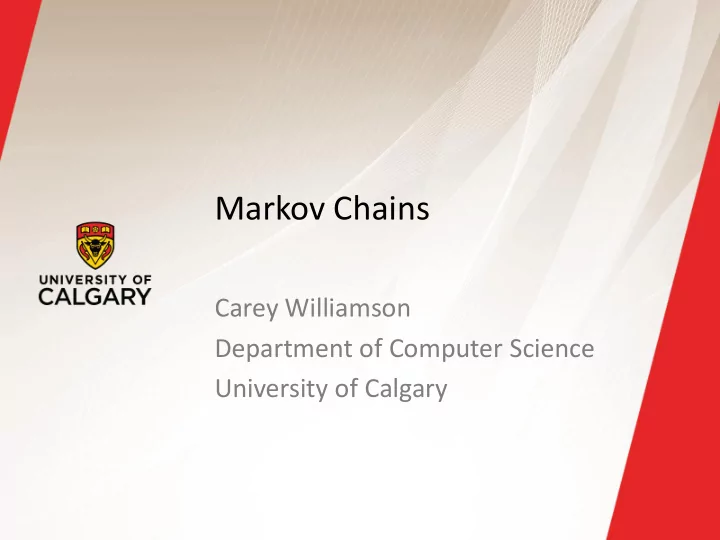

Markov Chains Carey Williamson Department of Computer Science University of Calgary
2 Outline ▪ Plan: — Introduce basics of Markov models — Define terminology for Markov chains — Discuss properties of Markov chains — Show examples of Markov chain analysis ▪ On-Off traffic model ▪ Markov-Modulated Poisson Process ▪ Erlang B blocking formula ▪ TCP congestion window evolution
3 Definition: Markov Chain ▪ A discrete-state Markov process ▪ Has a set S of discrete states: |S| > 1 ▪ Changes randomly between states in a sequence of discrete steps ▪ Continuous-time process, although the states are discrete ▪ Very general modeling technique used for system state, occupancy, traffic, queues, ... ▪ Analogy: Finite State Machine (FSM) in CS
4 Some Terminology (1 of 3) ▪ Markov property: behaviour of a Markov process depends only on what state it is in, and not on its past history (i.e., how it got there, or when) ▪ A manifestation of the memoryless property, from the underlying assumption of exponential distributions
5 Some Terminology (2 of 3) ▪ The time spent in a given state on a given visit is called the sojourn time ▪ Sojourn times are exponentially distributed and independent ▪ Each state i has a parameter q_i that characterizes its sojourn behaviour
6 Some Terminology (3 of 3) ▪ The probability of changing from state i to state j is denoted by p_ij ▪ This is called the transition probability (sometimes called transition rate) ▪ Often expressed in matrix format ▪ Important parameters that characterize the system behaviour
7 Desirable Properties of Markov Chains ▪ Irreducibility: every state is reachable from every other state (i.e., there are no useless, redundant, or dead-end states) ▪ Ergodicity: a Markov chain is ergodic if it is irreducible, aperiodic, and positive recurrent (i.e., can eventually return to a given state within finite time, and there are different path lengths for doing so) ▪ Stationarity: stable behaviour over time
8 Analysis of Markov Chains ▪ The analysis of Markov chains focuses on steady-state behaviour of the system ▪ Called equilibrium, or long-run behaviour as time t approaches infinity ▪ Well-defined state probabilities p_i (non- negative, normalized, exclusive) ▪ Flow balance equations can be applied
9 Examples of Markov Chains ▪ Traffic modeling: On-Off process ▪ Interrupted Poisson Process (IPP) ▪ Markov-Modulated Poisson Process ▪ Computer repair models (server farm) ▪ Erlang B blocking formula ▪ Birth-Death processes ▪ M/M/1 Queueing Analysis
Recommend
More recommend